Newborn tests and checks Top-to-toe examinations
Between 6 and 72 hours
after the birth, your baby will receive a detailed examination from a
doctor or pediatric nurse practitioner. The aim of this is to detect any
abnormalities that may not have been picked up by the prenatal
ultrasounds during pregnancy. If you need to see a specialist as a
result of these tests, an appointment will be made at a later date.
Other tests are done in the couple of weeks following the birth, at the
two-week well-baby checkup.
The first examination
During this initial
examination, your baby will be weighed and measured and his heart and
lungs will be listened to using a stethoscope. The roof of his mouth
will be checked to make sure that there is no cleft, or split, in his
palate and his eyes will also be examined. His limbs will be checked to
ensure that they match in length, and that his feet are properly aligned
with no sign of clubfoot. Your baby's tummy will be felt to check that
the internal organs are the right size and in the right place, and the
pulses in the groin will also be checked. The genitals will be examined,
and the spine will be checked to make sure that all of the vertebrae
are in place. His hip joints will also be looked at to ensure that these
are not dislocated and not “clicky,” which could lead to instability
later on. Your baby's reflexes will also be checked (see Newborn reflexes).
The heel stick test
Just before you go
home, at 24–48 hours of age, after your baby has been fed, the heel
stick test is done. Also known as the PKU test, it detects
phenylketonuria, a rare but serious condition that can be treated if
diagnosed early in your baby's life. Blood is taken from a heel or ear
lobe stick and dried onto a paper spot. In general it screens for over
50 genetic and metabolic illnesses.
Conditions that are identified
Most states include
the following categories in the spot screening: disorders of hemoglobin
(e.g. sickle cell) and the endocrine system (e.g. thyroid), amino acid
disorders (e.g. phenylketonuria), fatty acid oxidation disorders, and
organic acid disorders. Phenylketonuria is an inherited condition in
which babies are unable to process a substance in their food called
phenylalanine. Early treatment involves a special diet which can prevent
severe disability. Congenital hypothyroidism is one of the most common
conditions detected by newborn screening, with an incidence of 1 in
4,000 births. Cystic fibrosis screening is also included in most state
programs.
How the blood test is done
The blood test
involves the side of your baby's heel being pricked and several drops of
blood being carefully placed on a special card. The test can be done
while your baby is feeding, since this makes it less painful or alarming
for your baby. You can get the results from your doctor, although you
will be contacted if anything is detected. Sometimes more testing is
needed. Most babies screened will not have any of these conditions, but,
for those who do, early treatment can be vital to ensure long-term
health.
Your baby's hearing test
Two to three of every
1,000 children in the US are born deaf or hard-of-hearing, and more lose
their hearing later during childhood. Newborn hearing screening is
common practice in most hospitals and maternity centers. Testing is
noninvasive and quick. Some states mandate such testing (with the right
of parental refusal) while others strongly encourage it prior to
discharge. Still other states require only that information on hearing
screening be available to parents before they leave the hospital. Babies
who exhibit evidence of hearing loss should have an audiologic
assessment by three months of age and early intervention services by six
months of age. It is important that any hearing loss is picked up
within the first six months of life so that special support can be given
to ensure normal language development.
How your baby is checked
Heart and lungs:
A stethoscope will be used to listen to your baby's heart beat and his lungs and check that both of these sound normal.
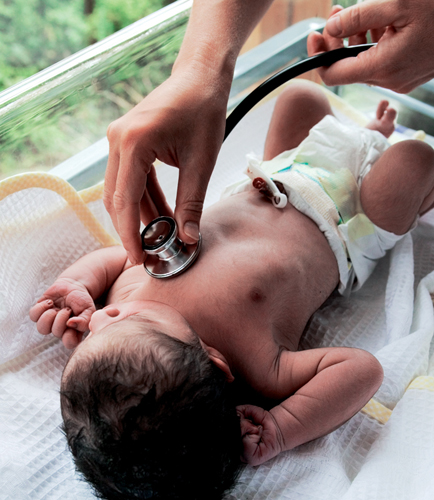
Head examination:
The shape of your baby's head will be checked and the soft spots on the skull, known as the fontanelles, will be examined.
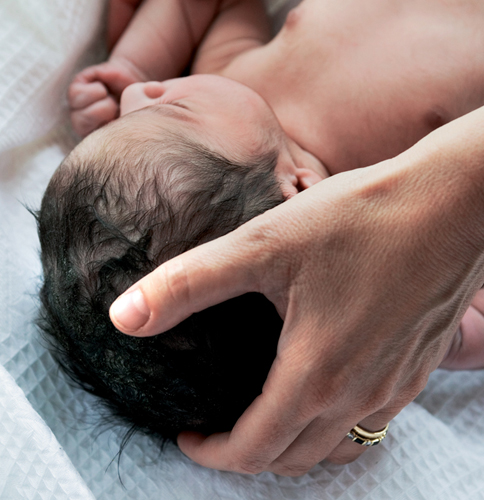
Mouth and palate:
The midwife or doctor will
check that there is no split in the roof of your baby's mouth that could
indicate a cleft, or split, palate.
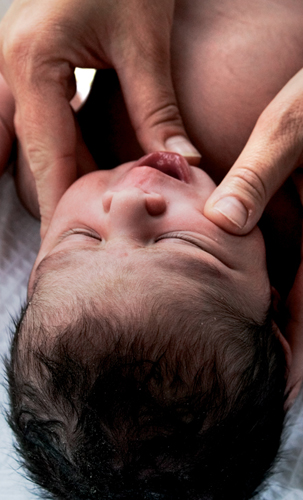
Feet and hands:
Each hand and foot is checked and the number of digits counted, and the feet are looked at to check that they align properly.
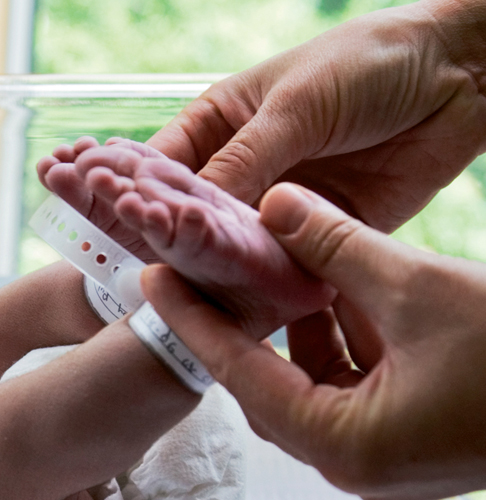
Hips:
The legs are bent
gently upward and then the hips are rotated to check that there is no
sign that the hips are dislocated, or “clicky.”
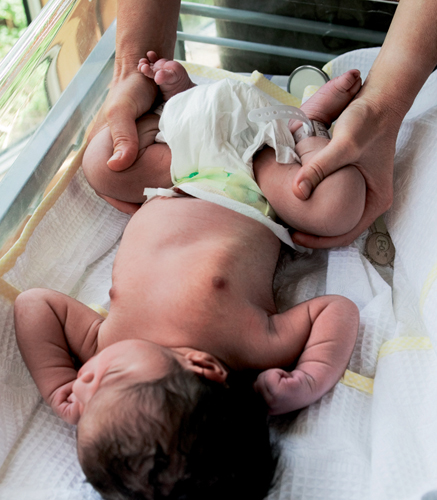
Spine:
Your baby will be
turned over and his spine will be examined to check that it is straight
and that there are no other abnormalities present.
